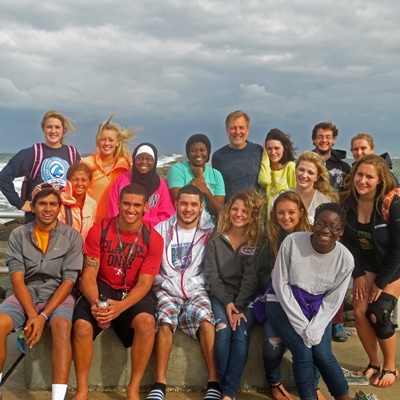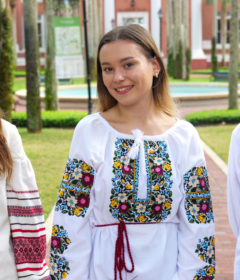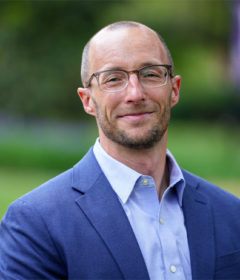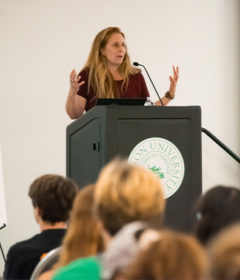How Do We Live Our Values?
 Can First-Year Seminar freshmen teach the university anything about values? You bet they can in Modern Languages and Literatures Professor Robert Sitler’s First Year Seminar titled “Living Our Values.”
Can First-Year Seminar freshmen teach the university anything about values? You bet they can in Modern Languages and Literatures Professor Robert Sitler’s First Year Seminar titled “Living Our Values.”
On the last day of class, Sitler, also the university’s values commitment leader, invited Stetson President Wendy B. Libby, Ph.D., and Dean of Students Rosalie Carpenter to hear about the students’ exploration of university values during the semester.
Libby began the conversation by giving a history of the university and how its values have evolved over time. She pointed to the university’s strategic plan that stresses “living our values more deeply” and said, “This is the foundation of everything we do.”
Stetson’s core values statement declares that the university “values the development of the whole person and is committed to engaging and building lifelong connections with the larger world through Personal Growth, Intellectual Development and Global Citizenship.” Embedded within this statement are the values of personal and social responsibility.
These Stetson freshmen voiced concerns about how the university should live out its values.
“How should we engage the entire community—faculty, staff and students—with our values,” asked Makeda Smith, a teaching apprentice for the class. She urged more effort be put into “encouraging students and staff to know, learn and develop personal values.”
Libby pointedly asked her own questions. “How do we know if Stetson is, indeed, living out its values? Is it important that every single person here embrace our values?”
Right now, each school or college at Stetson has cultural credit requirements. At least in this seminar, the students wanted to change the title of “cultural credits” to “values credits,” because then their efforts would be focused more clearly on values.
“Is it best to force people to do things so that they get their cultural credits?” Sitler also asked. “I can see both sides—changing the name from cultural credits to values credits might help. Shouldn’t we be doing these things because they are the right thing to do?”
William Moffitt, a freshman from Clearwater, Fla., shook his head: “I want to do it my way and not have someone tell me how I’m supposed to earn these credits. Maybe we could structure how we get credits around one year focusing on music and art, the next year business and social sciences and the following year something else.”
Carpenter asked the group: “How do we create experiences that enhance your learning about values?”
In a list of perspectives presented to the class, the students believe that much of that is already happening: “Stetson provides opportunities for students and staff to implement our values.”
The students agreed with Libby about how difficult it is “to measure and determine if each student, faculty, and staff are fulfilling every value.”
In the values perspectives document, the students also indicated that “cultural credits should move away from being mandatory because it can discourage students from fulfilling the requirement.”
Several students wanted university values events promoted more broadly. “There are often values events that we don’t know about,” said freshman Danielle Green of Miami. “There should be an easier way of finding out about these and promoting them in more creative ways.”
Like any open-ended discussion, however, there were more questions than answers, but isn’t that at the heart of an exploration of values?
To learn more about Stetson’s values discussion, visit www2.stetson.edu/other/values.
by Bill Noblitt



